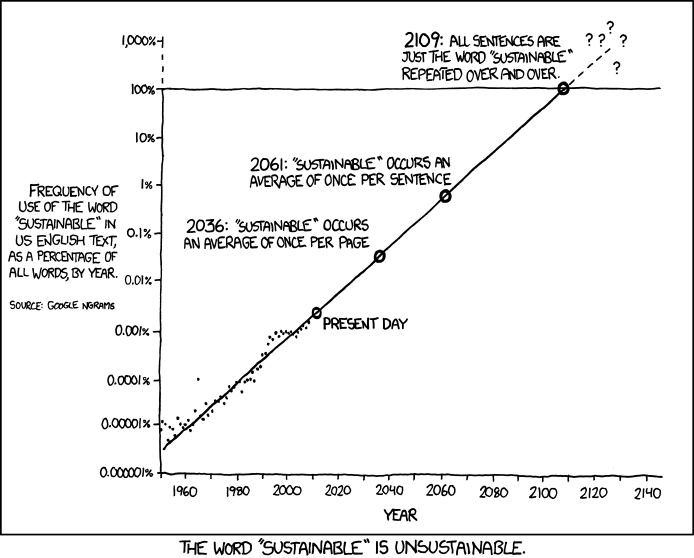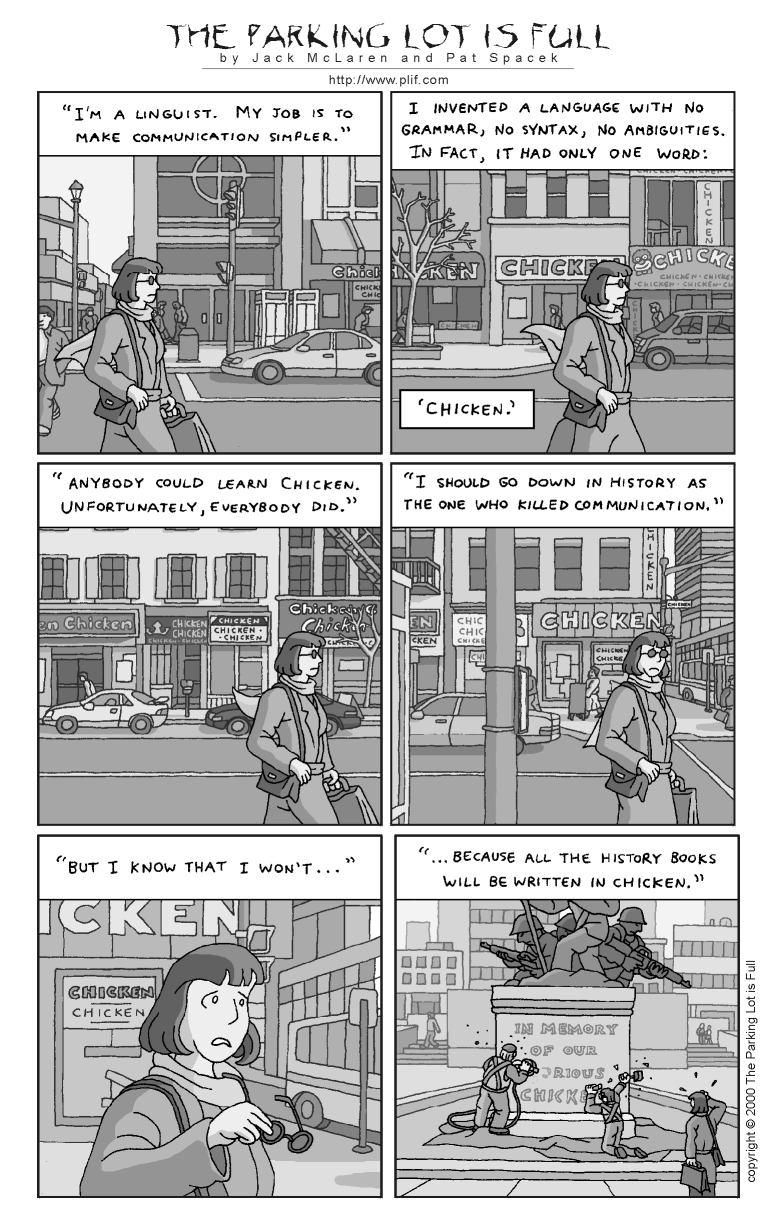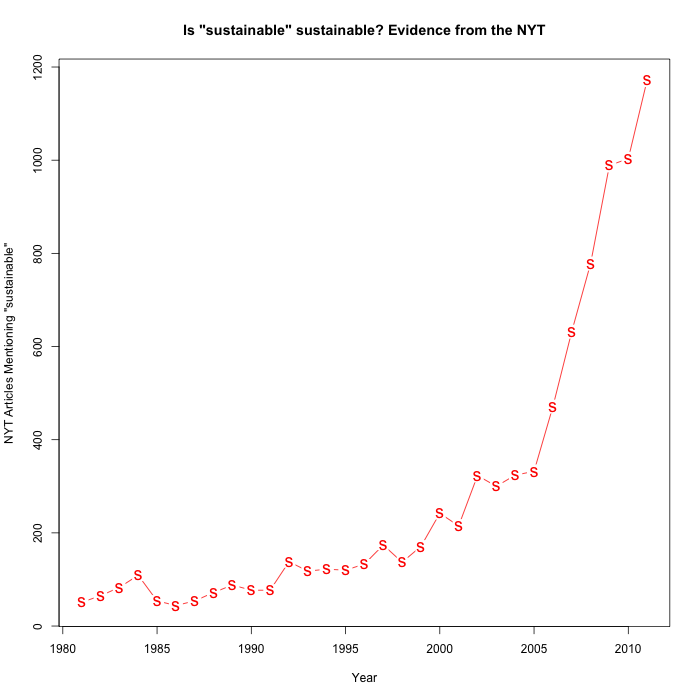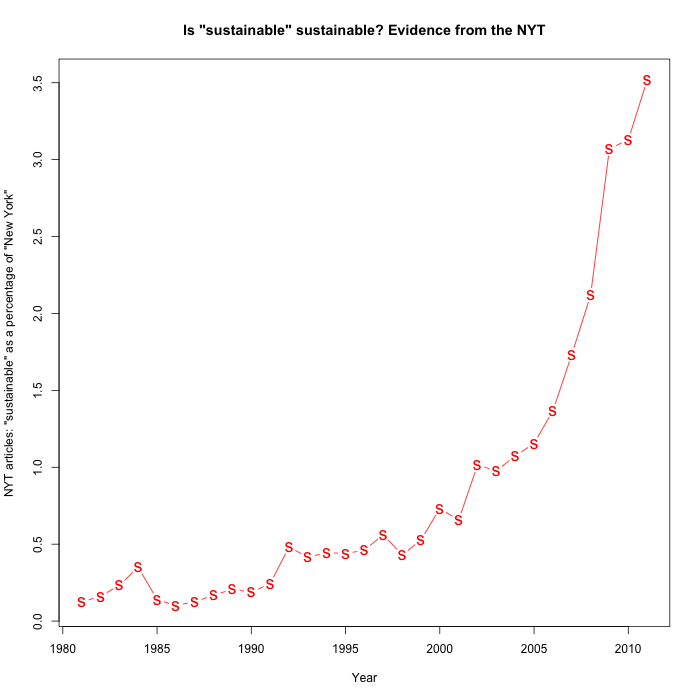The sustainability bubble
« previous post | next post »
Today's xkcd:
The actual numbers from Google Books suggest a sigmoidal pattern with an upper asympote substantially below 100%:
And similarly for sustainability:

As Someone's Law (whose?) says, "Exponential growth can't go on forever". But the small amount of attention that I've given to official corporate and academic communications over the past few years leaves me with the impression that the sustainable lexi-bubble is still expanding, supporting Someone's Corollary (whose?), "But it usually goes on for longer than you would think".
Anyhow, the logical endpoint has been explored in the case of Chicken (the language):
And also Chicken (the scholarly paper), and Chicken (the PowerPoint presentation):
Update — There's some discussion in the comments and in email to me about the actual facts of the sustainable lexi-bubble: are the Google Books ngrams an appropriate source of data, especially in the post-2000 period? What about American books vs. books in general? etc. So I fetched comparable data from the NYT archive, and got the following, which suggests that the growth is indeed continuing (though the rate of growth no longer seems to be accelerating, and perhaps has even slowed a bit):
And for those who worry that this might partly reflect an increase in the number of articles indexed, a demonstation that it probably doesn't, in the form of a plot of the number of articles mentioning sustainable as a percentage of the number of articles mentioning "New York":
Update 2 — The relevant (somewhat more general) maxim seems to be Stein's Law:
Things that can't go on forever, don't.
And the relevant caveat is to found in Davies' Corollaries:
1. Things that can’t go on forever, go on much longer than you think they will.
2. Corollary 1 applies even after taking into account Corollary 1.





Brett Reynolds said,
January 23, 2012 @ 8:08 am
Ngrams is case-sensitive. Adding in "Sustainable" doesn't change the shape of the curve, but it does bump up the frequency by about 30% at the right hand-end of the graph.
DES said,
January 23, 2012 @ 8:52 am
Beware of structural bias caused by shifts in the composition of the corpus over the years. For instance, if you extend the range to 2008 (the latest year it will allow), you will see a 20% drop in occurrences of "sustainable" between 2005 and 2008. I'm pretty sure that if you compiled statistics based on, say, newspaper articles instead of OCRed books, there would be no such drop.
Ed Wintergreen said,
January 23, 2012 @ 9:12 am
Of course you're right but your plot is not comparable: you've stopped at 2002 which is also a plateau on the XKCD plot, but on the original graph the data from then until the present day shows usage catching up to the exponential trend again.
Also XKCD uses the "American English" corpus rather than "English". It appears that "sustainable" is only unsustainable in America.
frederic said,
January 23, 2012 @ 9:50 am
It is sad to discover that a distinguished comic artist thinks that the job of a linguist is "to make communication simpler". I guess there is still a lot to explain linguistics to the general public. Oh sorry… I meant chicken chicken chicken chicken chicken chicken chicken chicken chicken chicken chicken…
Meanings: “Sustainable” | The Observatory said,
January 23, 2012 @ 9:58 am
[…] XKCD shows us that "sustainable" is not sustainable. Language Log comments. […]
Ellen K. said,
January 23, 2012 @ 10:06 am
Looking at the 4 English corpuses (besides "English"), American English and British English both show it continuing up. "English Fiction" and "English One Million" show it having peaked.
Brett said,
January 23, 2012 @ 10:08 am
I have heard, "Exponential growth can't go on forever," referred to as Eroom's Law, but that might have been a one-shot joke.
DonBoy said,
January 23, 2012 @ 10:15 am
Note that XKCD is using a log scale, and your graphs don't (as far as I can see, literally, as they are very tiny for me).
[(myl) You can make them bigger by clicking on them. And here's a version with counts on a log scale. Whether the y-axis is a log scale or not doesn't affect the basic point — if a linear plot shows decreasing slope — in fact approximately to zero — then a log plot will certainly not show the straight line corresponding to an exponential increase…]
Also, I've heard "If something can't go on, it won't", which seems to be a variant of something from Herb Stein (Ben's father).
[(myl) Thanks! This was more or less what I was looking for.]
Mr Fnortner said,
January 23, 2012 @ 10:36 am
Yes, there is a lot to explain to the general public about linguistics, yet I read the second sentence, the my-job-is sentence, as not defining linguistics but rather giving an example of the type of work this linguist is engaged in. Similarly, "I am an MD. My job is to …heal people …perform surgery …conduct research …mend bones", and so forth identify occupations for MDs.
[(myl) Also, it's a joke. And the punch line depends on the cited misunderstanding…]
frederic said,
January 23, 2012 @ 11:17 am
@Mr Fnortner
True, that's a possibility.
Michael Cargal said,
January 23, 2012 @ 2:53 pm
According to Google, several thousand people have said it in documents available on the web.
Rubrick said,
January 23, 2012 @ 3:48 pm
People have been making doomsday predictions about "peak sustainable" for years, but we keep finding new sources of sustainable, and we always will.
GeorgeW said,
January 23, 2012 @ 4:40 pm
This begs the question as to what 'sustainable' has displaced; specific words, phrases, sentences? Some of the synonyms given by MWCD do seem a little dated to me: Bearable, endurable, livable, sufferable, supportable, tolerable. Have these declined as 'sustainable' has risen?
Faldone said,
January 23, 2012 @ 5:24 pm
For "chicken" read "dude".
Ellen K. said,
January 23, 2012 @ 5:38 pm
Michael Cargal, have said what? I would think you are referring to "I'm a linguist. My job is to make communication simpler.", but that gets zero Google hits.
Lugubert said,
January 23, 2012 @ 7:40 pm
Faldone said,
For "chicken" read "dude".
Me: or "smurf".
Arnold Zwicky said,
January 23, 2012 @ 11:15 pm
As Angus Grieve-Smith notes on the Variationist List, the function here is a sigmoid function (graphed as an S-curve), not an exponential.
[(myl) In the real world, yes. In the xkcd cartoon world, the function is shown an positive-slope straight line on a scale of log proportions, corresponding to an exponential increase. If it were a sigmoid, a log-scale plot (like a linear-scale plot) would approach an upper asymptote without ever reaching it — the only difference between this part of the two plots would be the apparent rate of approach.
The joke in the xkcd plot is to extrapolate the recent sustainable trend linearly in terms of lexical probabilities. Whether this is done on a log scale or on a linear scale, it results in a line that eventually passes through 1 (= 100%) and goes beyond into the range labelled with question-marks in the xkcd plot, where (say) 150% of all words are sustainable. A straight line on a scale of log proportions accomplishes this absurdity via an exponential increase in proportions; a straight line on a scale of of plain proportions does it more gradually; but in both cases, the end result is nonsensical and thus funny.
In fact, the history of variationist sociolinguistics involved an early period when Bill Labov and others used linear regression on expected proportions or probabilities of occurrence, as in his paper "Contraction, deletion and inherent variability of the English copula", Language 1969. Cedergren and Sankoff ("Variable Rules: Performance as a Statistical Reflection of Competence", Language 1974) supported the idea of using multiple regression to model the effects of various factors on variation, but pointed out that an additive model on probabilities can yield nonsensical results, predicting that a given outcome will occur less than 0% or more than 100% of the time. They explained that an appropriate way to deal with this is to use a model in which the terms associated with different factors interact as in the class of models known as logistic regression. This involves transforming p (for proportion or probability) into log(p/(1-p)), and then fitting an additive model in the transformed space. For some discussion, see these lecture notes.
The xkcd cartoon embodies at least two jokes. The first one mocks the faddish overuse of sustainable. The second joke mocks the idea of blind quantitative extrapolation, such as linear extrapolation of (log) occurrence proportions or probabilities. In order to make these jokes work together, it's necessary to plot the (roughly) exponential increase in sustainable percentages on a log scale, so that it looks approximately linear and supports the humorous extrapolation to the precisely-dated worlds in which sustainable occurs once per sentence, once per word, and beyond…]
Keith M Ellis said,
January 23, 2012 @ 11:39 pm
Huh. I'd remembered that that was a famous Herb Stein (many times the man his son is) quote; but I'd forgotten that the corollary was dsquared's from back when he was less annoying. Granted, it's pretty much a less clever or interesting version of Hofstadter's Law, but still it's actually reasonably true and helpful.
I tried to keep both Stein's Law and Davies's Corollaries in mind during the Housing Bubble. And, sure enough, Corrollary #2 proved true.
Neuroskeptic said,
January 24, 2012 @ 6:58 am
Wittgenstein once said "A serious and good philosophical work could be written consisting entirely of jokes." I think he would have liked XKCD.
Sean McAleer said,
January 24, 2012 @ 8:12 am
The Dan Bejar corollary: All good things must come to an end; the bad ones just go on forever.
David said,
January 24, 2012 @ 1:03 pm
I've been wondering, since my wife spotted it, whether the fact that it's on a "log scale" is part of the joke. Sustainability, logging, etc…
Belial said,
January 24, 2012 @ 2:05 pm
By 2061 we will all be speaking in 100-word sentences?
[(myl) No: rather, the prediction is that 100% of our words will be sustainable.]
Belial said,
January 24, 2012 @ 2:41 pm
The graph shows for 2061 that the word occurs on average once per sentence, and pegs its frequency in text at 1%. To quote Sherlock Holmes, "the calculation is a simple one."
[(myl) Oops; I see. Good point.]
Rubrick said,
January 24, 2012 @ 6:08 pm
Extrapolating is, of course, one of Mr. Munroe's hobbies.
J. W. Brewer said,
January 24, 2012 @ 6:53 pm
Davies' Corollaries evoke for me the well-known maxim (with of course some variations in exact wording) in financial circles "the market can remain irrational longer than you can remain solvent," which is frequently attributed to J.M. Keynes but which is apparently difficult to find any evidence of prior to the 1990's, perhaps still early enough to antedate Davies: http://quoteinvestigator.com/2011/08/09/remain-solvent/
Link love: language (39) « Sentence first said,
January 27, 2012 @ 12:21 pm
[…] Is the word sustainable sustainable? (Yes.) […]
jwinchina said,
January 28, 2012 @ 10:55 pm
@GeorgeW: I second your question – are there words sustainable is replacing? Or are we just talking more frequently about a concept that only "sustainable" can express ("bearable" and "sufferable" don't really convey the same meaning of enduring success/development that sustainable seems to be used to convey these days – although maybe "supportable" would be a reasonable substitute).
Has anyone plotted a similar graph for the word "development"? I wonder if there are parallels… and I wonder if we will ever come up with alternative, and hopefully more precise, words to replace "sustainability." In my field of international health and health education, the definition of sustainable is now so wide it seems to mean little more than something we hope won't fail in the near future.